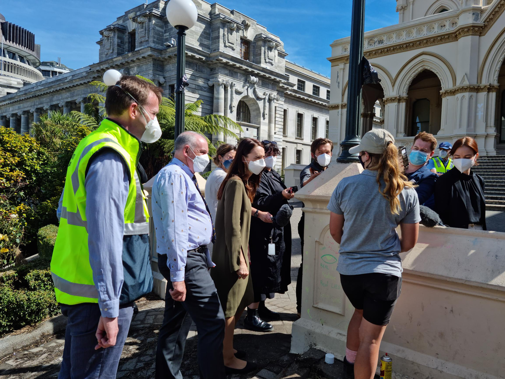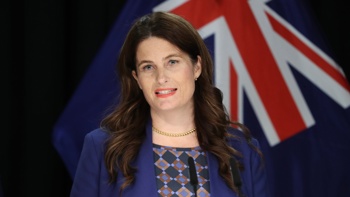
Prime Minister Jacinda Ardern said yesterday's violence on Parliament grounds was a sight she never expected to see and the area today was something akin to a "rubbish dump".
The grounds would be restored as quickly as possible and being able to return and enjoy the area would be quite symbolic for the public, she said.
Party leaders are in Parliament for the first time since more than 80 protesters were arrested and 40 police officers injured in violent clashes that saw the end to the 23-day anti-mandate occupation in Wellington.
The responsibility for yesterday was with those here, those who threw LPG gas bottles on the fires and threw bricks, Ardern said.
On the police force, Ardern said she was confident in the decisions they made and that they would be reviewing their actions.
Ardern said she stood by the decision at the beginning to not engage with protesters. From the beginning, media were abused and chased away, aggressive statements, noose hanging on the front lawn.
"What we saw was very confronting for us as a country, protest and violence we are not used to here."
On disinformation, Ardern said it was often those already less trusting of Government and media and institutions. That's why there needed to be a collective response, she said.
What happened was not good enough, she said.
Ardern is speaking in Parliament about the protests, saying she had watched some of the action yesterday from a Beehive window. She watched as the protesters set fire to the playground.
She said this protest had been different from the moment it arrived. "It was a form of protest I did not recognise".
Ardern said that 40 police officers were injured, and eight were admitted to hospital yesterday. In total, 600 police staff were involved and 50 firefighters.
The PM condemned the 23-day occupation protest, and Opposition leader Christopher Luxon joined her in giving thanks to emergency service personnel who worked at the chaotic scenes yesterday.
"This will always be a place where difference can be expressed," Ardern said this afternoon.
But she said differences should be expressed in ways that dignify Parliament.
Ardern said to the police, fire and security staff: "To each of you, we say thank you. You were there throughout these events at great risk to yourselves. Many of you were abused, some were injured. But you put your personal safety aside, in order to look after others. And for that we are very grateful."
"To Wellingtonians, I am sorry for what you have had to endure, but I thank you for your resilience. I hope your sense of safety and confidence has been restored."
After police cleared the grounds in an often violent confrontation with protesters, Ardern said she was "both angry and deeply saddened" to see Parliament's grounds treated in that way.
She said police had expected hostility, resistance and violence "it is another thing entirely to witness it".
Ardern said it was a protest she had struggled with from the start.
"I have watched protests come to Parliament over the years. I have received petitions, and I have spoken at many. And yet the day this one arrived it was clear it was different," she said.
"There was an immediate focus on occupying the space. The rhetoric that came from the speakers they installed swung between benign to sometimes threatening. Many media who walked the grounds were either abused or in some cases chased away.
"It was a form of protest I did not recognise. And I found it hard to reconcile it with the reality of what all New Zealanders had faced in this pandemic, and yet quietly got on with it."
Luxon calls for review
Luxon said the convoy occupation expressed "real animus" and everybody owed the New Zealand Police thanks.
He added: "It is still vital to examine how we got here in the first place."
Luxon said a review of how authorities acted was needed. Those authorities included Speaker Trevor Mallard, Luxon said.
He said two years ago, New Zealand was united in combating the pandemic.
"But Kiwis are frustrated that what was simple then has become messy and complicated two years on."
And he said a "reprehensible, disaffected minority" like the convoy protest occupiers should not prevent New Zealand from asking questions about the pandemic response.
Luxon said it was important to be able to have respectful debates about the pandemic response and other issues.
"We don't always agree on the way forward and that is proper in a functioning democracy."
Luxon said he was proud that all party leaders in Parliament had refused to meet with the protesters unless they de-escalated the protest, saying that was something they had now demonstrated they could not do.
"But we cannot risk putting aside other New Zealanders' valid concerns because of the reprehensible behaviour of a minority."
Ugly scenes 'rocked me' – Greens co-leader
Marama Davidson, Green Party co-leader, said yesterday was a positive day for policing.
"I want to acknowledge the courage that it took for police to maintain as much of a de-escalation and harm-minimisation approach as possible," she said in the House of Representatives.
She said the 23-day occupation drew upon several unhinged and misanthropic tropes.
She said right-wing agitators were spinning out disinformation.
"They also need to be accountable."
Davidson said some protesters should have asked themselves why they were putting children at risk.
She also said seeing the conflict yesterday shocked her, as it would have appalled others.
"I was watching humans being harmed, and that rocked me.
"I want everyone to be able to recover physically, spiritually and mentally."
Green party co-leader James Shaw said New Zealand had remarkable levels of social cohesion "but there is another virus another global pandemic which we with our 'she'll be right' attitude have almost no immunity to".
The disease was one of disinformation and trolling, Shaw added.
He said police worked to ensure the least violent possible resolution despite putting up with abuse for days.
"Grifters and charlatans" melted away like cowards yesterday and left desperate people to fight the police on Parliament's fields.
Act leader David Seymour said police faced extreme and reckless violence yesterday, and handled the occupation with professionalism and courage.
'What were you thinking?'
Seymour said New Zealand owed a huge debt of gratitude to the police, fire serve and ambulance who answered the call of duty.
He said occupation protesters might have believed the ends justified the means - but most protesters knew the preservation of society was worth more than any one cause.
"You can't talk about civil liberties when you're threatening others," Seymour said.
While the protest had a disturbing ethos, it was important to ask why so many people were concerned about the pandemic response, he said.
Although disinformation was a problem, it was not good enough to just blame that for everything that happened in the occupation, Seymour added.
The Act leader referred to Speaker Trevor Mallard, who had referred to protesters as "ferals".
Seymour addressed Mallard and told him: "What were you thinking?"
He said the Government had made plenty of mistakes but apologised for nothing except for the 1970s dawn raids.
"What we need is dialogue and discussion about how we go forward...rather than trying to demonise people," Seymour said.
"Most of all, New Zealand needs hope, healing and humanity."
Take your Radio, Podcasts and Music with you









